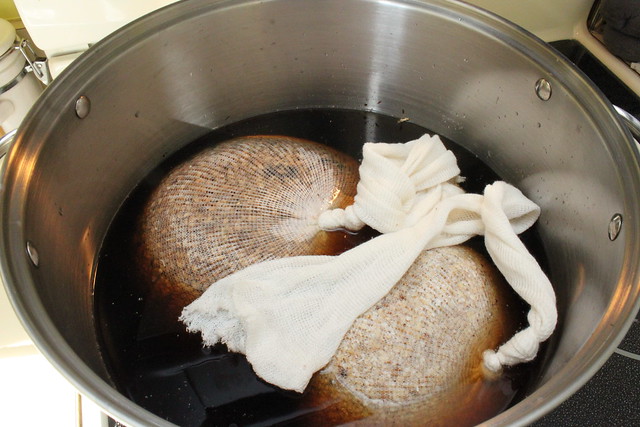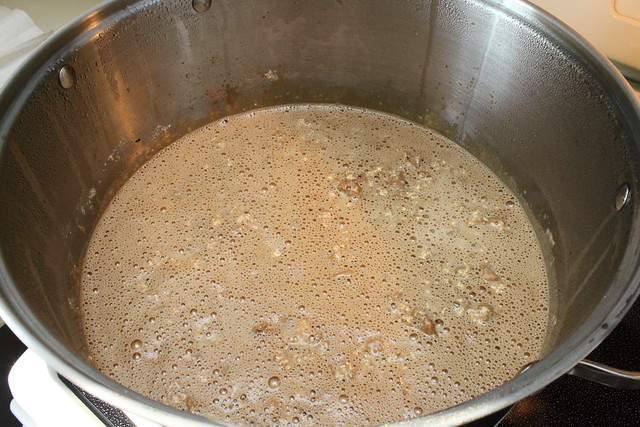Let me say first that having a successful brew under my belt made a huge difference in my attitude toward the second one. When I started brewing 8-Bit Ale, I was so keyed up that I couldn't even focus. I don't know why; it's just how I am. I was so desperate for everything to go right that I was ensuring that it wouldn't. Having had that experience, I approached Secret Santa Stout with a comparatively Buddha-like calmness.
This recipe doesn't ask for anything more advanced, technique-wise, than the last one. It just has a lot more ingredients. The whole thing starts with the steeping of some grains. The included grains -- chocolate malt, Munich malt, and roasted barley -- needed to be cracked before use. I poured them, little by little, into a large plastic freezer bag, and then attacked them with a rolling pin. Charlie Papazian recommends not pulverizing the grains. You're just looking to breach the husks. It was hard to tell how I did on this score, because there were plenty of fine particles left over, but no reason to sweat it.
When all of them were cracked, I tied them into a (very heavy) muslin bag. I poured the flaked oats into another muslin bag and tied it off. Then I filled my brew pot with two gallons of water and added the grains. I turned on the heat, and brought it up to temperature. I never did replace the broken thermometer from the last time, so I'm still using a meat thermometer to measure the temperature of my water. I'm not sure how accurate the reading is, since it only goes a few inches into the water, but I tried to stir the water around the bags occasionally in order to evenly distribute the water. When the reading reached 150 degrees F, I turned off the heat, covered the pot, and steeped for 30 minutes.
After that, I was supposed to add the malt extracts and the Galena hops, but we realized we needed some things at the grocery store -- in particular, a replacement thermometer. See, our digital thermometer went bonkers, giving readings in both Fahrenheit and Celsius, and refusing to turn off. In attempting to open up the battery compartment, we ended up breaking the whole thing. So it was off to the store. I removed the grains from the pot first, but let the tea sit on the stove, covered, for another 30 minutes or so until we got back.
At that point, I added the malt and the boiling hops. Unlike last time, I used a dry malt extract instead of a syrup. Dry was definitely easier to work with, since I didn't have all the prep work of soaking it in hot water and then spooning it out. But it did form big, sticky clumps in the water that took a few minutes of heating to dissolve. I have no idea how dry extracts compare to syrups in terms of the finished product, but as a lazy homebrewer I will say that I definitely prefer the powdered version.
As before, I'm using pre-measured hop pellets, not whole hops. Not much to say there. You just cut open the plastic package and dump them in. Couldn't be easier. After boiling with the Galena hops for 45 minutes, I added the Golding hops for the final 15 minutes. Although I chose this recipe for its maltiness, I was surprised to realize that it's actually much hoppier than the amber ale I brewed last winter. Doubly so, in fact -- 3 ounces, compared to 1.5! That's part of the reason I'm so excited about the recipe. There's a lot more going on.
After an uneventful boil, the step was one that had caused me much frustration the last time: cooling the wort and pitching the yeast. Would I have learned my lesson?


No comments:
Post a Comment